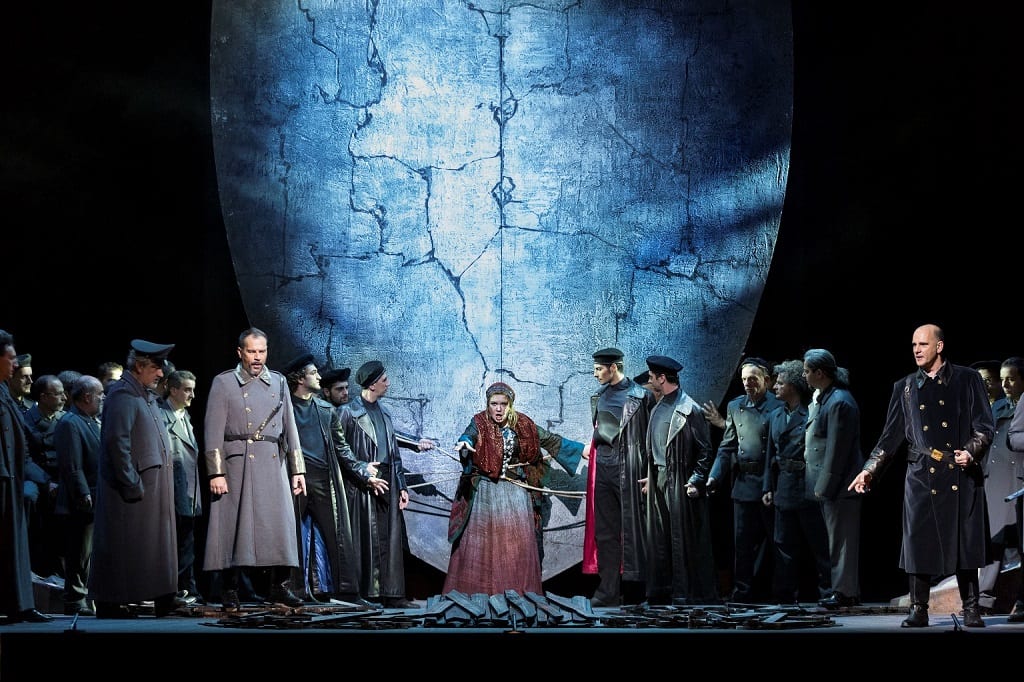Il Trovatore’s striking contrast between lyric melodies and chilling events on stage have made it long ago one of Verdi’s most popular operas. With so many iconic historic performances in memory, a new production of Il Trovatore always runs into the risk of being considered as another cover version. Fortunately, it is not the case with this production, which is loaded with unique moments and fresh ideas, together with some outstanding performances.
This opera requires five of the greatest voices in the world to work perfectly. This production clearly has three great voices and a Manrico who is good enough. This should encourage one to go and see it, if at all possible.
The opera itself is truly a masterpiece; and the regular criticism that it has a preposterous plot is nonsense. It is, effectively, a ballad; a tale told around the fire at night; a kind of fairy tale, even. If one accepts it at that level, it is actually a cogent piece of dramaturgy and it is astonishingly moving as well as entertainingly spectacular. At the centre of the opera is the mother-figure, Azucena. If that role works, the rest of it tends to work and come into focus and Manrico’s relations both with Leonore and Azucena make more sense. In this production Azucena is the central success both vocally and dramatically, which makes it very exciting.
The opening scene of this production is not too promising with the performance of bass-baritone Carlo Stirulli as Ferrando. Soon things get much better with the emergence of soprano Dinara Alivea in the lead role of Leonora, demonstrating a very warm voice, not too powerful but perfect for moving moments such as her elegy in the beginning of the act IV. The American mezzo-soprano Marianne Cornetti is the unquestionable star of this production in her role as the gypsy mother Azucena. Her beautiful and powerful voice is accompanied by humane acting skills, in a way that makes her presence on the stage so notable even in moments when her voice is not heard.
Another highlight of the Tel Aviv production is the baritone George Petean as the Count di Luna. He is blessed with a wonderful voice combined with dramatic presence. The other leading male role of Manrico, sung by tenor Alfred Kim, is not as convincing. I would love to listen to his pleasant voice in a more chamber type of environment but the big opera house was a bit too much for him. The Israeli mezzo Anat Czarny did well in her minor role as Inez.
Il Trovatore is so well known for its iconic Chorus pieces, all sung very beautifully by the Israeli Opera Chorus under Master Ethan Schmeisser. The conductor, Daniel Oren, who is usually quite wonderful in Verdi, is totally engaging. He masterfully teases out the nuances of the piece and masterfully harmonises orchestra and singers. His enthusiasm carries the entire Israel Symphony Orchestra Rishon le-Zion, in particular the wind and brass sections whose roles are so prominent in this opera.
One notable novelty of this production is the video work of Michal Rovner, created especially for Il Trovatore. Unlike many adaptations of old opera stories to contemporary stories, the introduction of modern technology into a 160 years old opera does not damage its originality and faithfulness to the source. On the contrary, in an opera that demonstrates so tragically the cheap value and temporariness of human life, the hundreds of miniature ant-size people marching on the screen are powerful amplifiers of the message.

